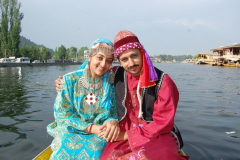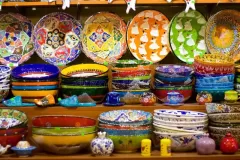Discover the Rich Culture of Neelum Valley, AJK
Neelum Valley, located in Azad Jammu and Kashmir (AJK), is a picturesque region renowned for its breathtaking landscapes and vibrant culture. Nestled between lush green hills and the serene Neelum River, the valley offers a unique cultural experience influenced by its diverse history and natural beauty.
People of Neelum Valley
The people of Kashmir, commonly known as Kashmiris, are a vital part of the region’s rich cultural mosaic. With diverse ethnicities, religions, and languages, they collectively shape the unique character of Kashmiri society. The population includes a harmonious blend of Muslims, Hindus, Sikhs, and Buddhists, fostering an inclusive and pluralistic ethos that has defined the region for centuries.
Known for their warmth and resilience, Kashmiris possess a cultural identity deeply rooted in their history and the region’s geographic splendor. Despite challenges posed by various historical and geopolitical factors, they continue to uphold their traditions, pass down age-old customs, and demonstrate a remarkable spirit of unity. Whether participating in traditional festivities, engaging in communal celebrations, or observing their respective religious practices, Kashmiris play a crucial role in preserving and perpetuating the cultural legacy of this enchanting valley.
Traditional Dresses
Traditional dresses of Kashmir, such as the Pheran and Kashmiri shawls, embody the region’s rich cultural heritage and exquisite craftsmanship. The Pheran, a loose, long garment adorned with intricate embroidery, is worn by both men and women for warmth and style. Renowned Kashmiri shawls, including Pashmina and Shahtoosh, are celebrated for their softness and detailed designs. Women’s traditional headgear, like the Taranga for Hindu women and the Kasaba for Muslim women, often complement the Pheran. Men’s attire includes Ghora trousers, paired with a Pheran and waistcoat. Completing these outfits, Kashmiri jewelry, such as Dejhoor earrings and Kantha necklaces, adds an elegant touch, highlighting the region’s artistic flair and cultural depth.
Cuisines
Cuisines of Kashmir
Kashmiri cuisine is a delightful blend of rich flavors and aromatic spices, reflecting the region’s cultural diversity. The famous Wazwan feast, a multi-course meal, showcases dishes like Rogan Josh, Gushtaba, and Yakhni, prepared with expert skill and traditional recipes. Vegetarian dishes, such as Dum Aloo and Nadru Yakhni, highlight the use of local produce and spices. Kashmiri bread, including Sheermal and Tsot, accompanies most meals. Saffron, an essential ingredient in many dishes, adds a unique taste and vibrant color. The traditional beverage, Kahwa, a fragrant green tea with saffron and almonds, perfectly complements the rich and hearty Kashmiri meals.
Image Galley of Traditionally Kashmiri Foods
no images were found
Festivals and Observances
Festivals and Observances in Kashmir
Kashmir’s festivals and observances reflect the region’s rich cultural diversity and communal harmony. Eid-ul-Fitr and Eid-ul-Adha are major Islamic celebrations marked by prayers, feasts, and charity. The Hindu festival of Shivratri, known locally as Herath, involves elaborate rituals and family gatherings. Navreh, the Kashmiri New Year, is celebrated with traditional meals and prayers. Sikh communities observe Baisakhi with vibrant processions and community meals. The region also celebrates harvest festivals like Lohri and Baisakhi, highlighting agricultural traditions. During these festivals, the spirit of unity and cultural heritage is evident, as people come together to celebrate with music, dance, and festive foods.
Handicrafts
Handicrafts of Kashmir
Kashmir’s handicrafts are renowned for their exquisite artistry and intricate designs, reflecting the region’s rich cultural heritage. Pashmina shawls, made from the fine wool of Himalayan goats, are celebrated worldwide for their softness and warmth. Kashmiri carpets, woven with elaborate patterns and vibrant colors, are a testament to the skill of local artisans. Papier-mâché items, often painted with detailed floral motifs, showcase the region’s artistic traditions. Woodwork, including intricately carved walnut furniture and decorative items, highlights the craftsmanship of Kashmiri woodworkers. Additionally, Kashmiri embroidery, known as “Aari” and “Sozni,” adorns garments and home textiles with beautiful, delicate patterns. These handicrafts not only represent the cultural identity of Kashmir but also contribute significantly to its economy.
Dance and Music in Kashmir
Kashmir’s vibrant culture is deeply intertwined with its rich tradition of dance and music, reflecting the region’s diverse heritage. Rouf, a traditional folk dance performed by women, involves rhythmic movements and graceful gestures, accompanied by songs praising nature and celebrating life. The Bacha Nagma, a lively dance performed by men, showcases intricate footwork and energetic movements, often accompanied by traditional musical instruments like the Rabab and Santoor. Sufiana Kalam, a form of devotional music, resonates with spiritual lyrics and soulful melodies, inspiring a sense of peace and tranquility. Additionally, the vibrant beats of the Dhol and Nagara drums add rhythm and energy to festive occasions and celebrations. Through dance and music, Kashmiris express their joy, sorrow, and spiritual devotion, keeping alive the cultural legacy of the valley for generations to come.
Religion and Language in Kashmir
In Kashmir, diverse religions—Islam, Hinduism, Sikhism, and Buddhism—coexist harmoniously, fostering mutual respect. The linguistic landscape is equally varied, with Kashmiri, Urdu, Hindi, and English widely spoken, each contributing to the region’s cultural richness and unity.
The bottom line
Kashmir’s rich cultural tapestry, woven with diverse religions, languages, and traditions, exemplifies unity in diversity, fostering mutual respect and enriching the region’s unique identity.
Discover more from Neelum City Hotel
Subscribe to get the latest posts to your email.











